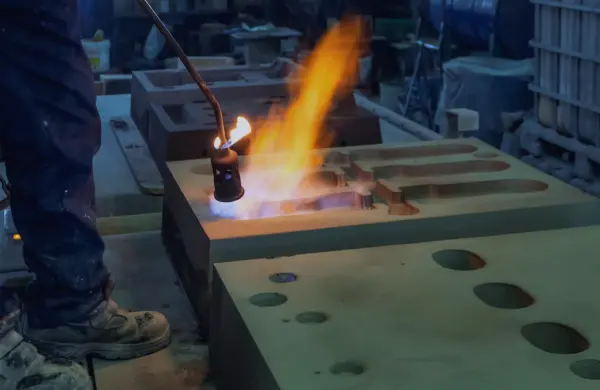The Basic Principles Of Alcast Company
The Basic Principles Of Alcast Company
Blog Article
The Buzz on Alcast Company
Table of ContentsThe smart Trick of Alcast Company That Nobody is DiscussingSome Known Details About Alcast Company The Definitive Guide to Alcast CompanyGetting My Alcast Company To WorkThe Ultimate Guide To Alcast CompanySee This Report about Alcast Company
The refined distinction exists in the chemical web content. Chemical Contrast of Cast Aluminum Alloys Silicon promotes castability by decreasing the alloy's melting temperature and enhancing fluidness throughout spreading. It plays a critical role in allowing complex mold and mildews to be filled up precisely. Furthermore, silicon adds to the alloy's toughness and put on resistance, making it beneficial in applications where resilience is critical, such as automotive parts and engine elements.It also enhances the machinability of the alloy, making it easier to refine right into finished items. By doing this, iron adds to the total workability of aluminum alloys. Copper raises electric conductivity, making it helpful in electrical applications. It likewise improves corrosion resistance and includes to the alloy's general stamina.
Manganese contributes to the toughness of aluminum alloys and boosts workability. Magnesium is a lightweight aspect that provides toughness and impact resistance to light weight aluminum alloys.
The 8-Second Trick For Alcast Company
Zinc enhances the castability of aluminum alloys and assists regulate the solidification procedure throughout casting. It enhances the alloy's stamina and firmness.

The primary thermal conductivity, tensile strength, yield strength, and elongation differ. Select appropriate basic materials according to the efficiency of the target product created. Among the above alloys, A356 has the highest thermal conductivity, and A380 and ADC12 have the cheapest. The tensile limit is the opposite. A360 has the best yield strength and the highest elongation rate.
The 10-Second Trick For Alcast Company

In accuracy spreading, 6063 is well-suited for applications where complex geometries and high-quality surface coatings are critical. Examples consist of telecommunication enclosures, where the alloy's exceptional formability enables sleek and aesthetically pleasing styles while keeping architectural integrity. Likewise, in the Illumination Solutions sector, precision-cast 6063 parts create elegant and effective illumination components that call for intricate shapes and great thermal efficiency.
It results in a finer surface finish and much better rust resistance in A360. Additionally, the A360 shows premium prolongation, making it ideal for complex and thin-walled components. In accuracy spreading you can try here applications, A360 is appropriate for markets such as Consumer Electronics, Telecommunication, and Power Tools. Its boosted fluidity allows for detailed, high-precision parts like mobile phone housings and interaction tool housings.
Get This Report about Alcast Company
Its special properties make A360 an important option for precision casting in these industries, boosting item durability and quality. Casting Foundry. Light weight aluminum alloy 380, or A380, is an extensively made use of spreading alloy with numerous unique attributes.
In precision spreading, aluminum 413 beams in the Consumer Electronics and Power Equipment industries. This alloy's premium rust resistance makes it an outstanding selection for outdoor applications, making certain durable, durable products in the pointed out industries.
The Single Strategy To Use For Alcast Company
When you have actually decided that the aluminum pass away casting procedure is suitable for your job, a crucial next step is choosing the most suitable alloy. The light weight aluminum alloy you pick will substantially affect both the spreading process and the residential or commercial properties of the end product. Due to this, you should make your decision meticulously and take an informed technique.
Establishing one of the most ideal light weight aluminum alloy for your application will certainly suggest considering a vast selection of features. These relative alloy attributes comply with the North American Die Casting Association's standards, and we have actually separated them into two classifications. The very first category addresses alloy qualities that affect the production procedure. The second covers characteristics affecting the residential or commercial properties of the end product.
Get This Report about Alcast Company
The alloy you select for die spreading directly influences several elements of the spreading process, like just how simple the alloy is to collaborate with and if it is prone to casting flaws. Hot splitting, additionally referred to as solidification fracturing, is a common die spreading defect for light weight aluminum alloys that can cause interior or surface-level rips or cracks.
Specific light weight aluminum alloys are more susceptible to hot fracturing than others, and your selection must consider this. An additional common problem located in the die spreading of aluminum is die soldering, which is when the actors adheres to the die wall surfaces and makes ejection challenging. It can harm both the actors and the die, so you need to look for alloys with high anti-soldering properties.
Rust resistance, which is already a remarkable feature of light weight aluminum, can differ substantially from alloy to alloy and is an important characteristic to think about depending on the environmental conditions your product will be subjected to (Foundry). Wear resistance is another home frequently sought in aluminum items and can set apart some alloys
Report this page